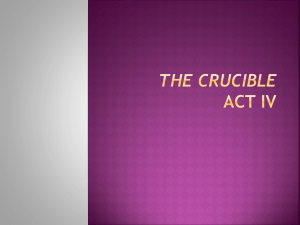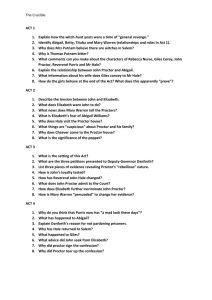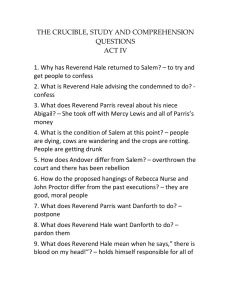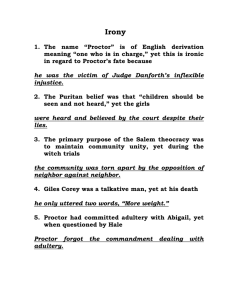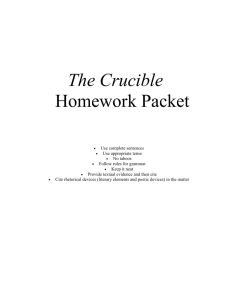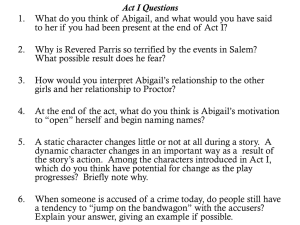Act One - Petal School District
advertisement
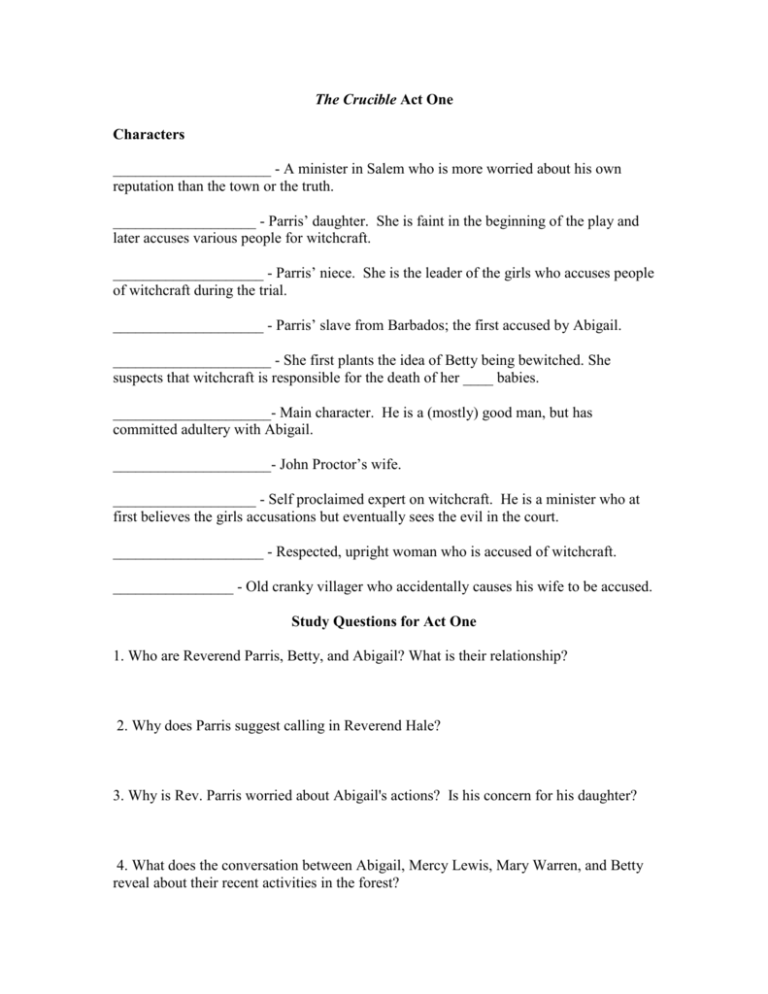
The Crucible Act One Characters _____________________ - A minister in Salem who is more worried about his own reputation than the town or the truth. ___________________ - Parris’ daughter. She is faint in the beginning of the play and later accuses various people for witchcraft. ____________________ - Parris’ niece. She is the leader of the girls who accuses people of witchcraft during the trial. ____________________ - Parris’ slave from Barbados; the first accused by Abigail. _____________________ - She first plants the idea of Betty being bewitched. She suspects that witchcraft is responsible for the death of her ____ babies. _____________________- Main character. He is a (mostly) good man, but has committed adultery with Abigail. _____________________- John Proctor’s wife. ___________________ - Self proclaimed expert on witchcraft. He is a minister who at first believes the girls accusations but eventually sees the evil in the court. ____________________ - Respected, upright woman who is accused of witchcraft. ________________ - Old cranky villager who accidentally causes his wife to be accused. Study Questions for Act One 1. Who are Reverend Parris, Betty, and Abigail? What is their relationship? 2. Why does Parris suggest calling in Reverend Hale? 3. Why is Rev. Parris worried about Abigail's actions? Is his concern for his daughter? 4. What does the conversation between Abigail, Mercy Lewis, Mary Warren, and Betty reveal about their recent activities in the forest? 5. Give three characteristics of John Proctor. 6. Explain why Proctor feels like a fraud. 7. Why didn't the Putnams like the Nurses? (Give at least two reasons.) 8. Give two examples that Proctor and Corey give for why Parris is an ineffective minister. 9. What is the Putnams’ grievance over land? What significance might this have? 10. Reputation is tremendously important in Salem. Various characters base their actions on the desire to protect their reputations. Discuss how the actions of Rev. Parris and Abigail are motivated by reputation. 11. Look up redemption in the dictionary. Write out the definition (without using the word redeem). Which character seems most concerned about being redeemed? 12. Explain the paradox that Arthur Miller highlights in Act I: "for good purposes, even high purposes, the people of Salem developed a theocracy, a combine of state and religious power whose function was to keep the community together, and to prevent any kind of disunity that might open it to destruction by material or ideological enemies. It was forged for a necessary purpose and accomplished that purpose. But all organization is and must be grounded on the idea of exclusion and prohibition, just as two objects cannot occupy the same space. . . The witch-hunt was a perverse manifestation of the panic which set in among all classes when the balance began to turn toward greater individual freedom." The Crucible, Act Two 1. What does the scene between Elizabeth and John Proctor reveal about their relationship and about their characters? 2. What does Elizabeth encourage John to do? 3. Explain Elizabeth's statement: "John, if it were not Abigail that you must go to hurt, would you falter now? I think not?" What does she think? 4. What is the gift Mary Warren gives to Elizabeth? 5. What information does Mary Warren provide about the trial? What role is she playing at the trial? 6. How many had been arrested for witchcraft at this point? 7. Mary Warren tells Proctor that those accused will not hang if they do something-what is it that they must do? 8. Explain why Mary Warren thinks Elizabeth should speak civilly to her (more than one reason)? 9. Why does Rev. Hale come to the Proctor's home? What does this scene reveal about Hale's role in the trial? 10. What does Proctor tell Hale about why the children were ill? How does he claim to know? 11. What is the point of the discussion between Hale and the Proctors about whether or not they believe in witches? Why is it so important to Hale that the Proctors believe in witches? 12. What event begins to change Hale's opinion about the arrests? How does he feel about the court? 13. Who do you think accused Elizabeth and why? 14. Which of the Ten Commandments does Proctor forget? 15. How are these two ideas connected: 1) Walcott buying a pig. 2) Martha Corey being accused of witchcraft. 16. What is an “allusion”? 17. Explain the allusion that Proctor makes to Pontius Pilate. 18. What does Proctor want Mary Warren to do after Elizabeth is arrested? What is her response to this? 19. What do we learn about Mary Warren's motives at the end of the act? Why did she give the poppet to Elizabeth? The Crucible, Act Three 1. Who does Proctor bring into court with him? 2. What does Mary Warren tell Judge Danforth? 3. What do the girls do to convince the men otherwise? Why? How do their actions further befuddle (confuse) Mary? 4. What is the significance of Proctor plowing on Sunday? 5. What does Judge Danforth tell Proctor about Elizabeth? 6. What arrangement does Danforth make for Elizabeth regarding the date of her hanging? 7. Danforth assumes Proctor would drop his fight once Elizabeth's arrangement is made - why does Proctor refuse to back down? 8. What document does Proctor present to Danforth, and what does the document say? 9. How many people have signed the document? 10. What does Danforth do to those who signed the document presented by Proctor? 11. Explain the statement made by Danforth: "a person is either with this court or he or she must be counted against it, there be no road between." 12. What accusation does Giles Corey make against Thomas Putnam? 13. What information does Corey withhold from the court? 14. Who does Danforth say can best identify a witch? 15. What can Mary Warren not do when requested? What point does Danforth make about it? 16. What secret does John openly admit to Danforth? 17. What does Elizabeth do to protect John Proctor's name? 18. What does Mary Warren say to reverse her reversal of prior testimony? 19. What change occurs in the opinion of Rev. Hale? What does he do at the end of Act III? Act IV 1. What do we learn about Abigail at the beginning of Act IV? What is Danforth’s reaction? 2. Why has Rev. Hale returned to Salem? 3. What is happening in Andover, and why does it frighten Danforth and Parris? 4. Why are the people of Salem stirred up about the last group of accused people? 5. Why is Proctor’s confession so important to Rev. Hale? Why is it so important to Parris that Proctor is not hanged? 6. What does Rev. Hale mean when he says that there is blood on his head? What earlier quote (in Act II) does this remind you of? 7. Who do Parris, Hale, and Danforth use to persuade Proctor? 8. Why does Giles Corey choose death by pressing over death by hanging? 9. What motivates Proctor's initial decision to lie? 10. What does Proctor mean when he refuses to let Danforth take his signed confession and explains, "Because it is my name! Because I cannot have another in my life! Because I lie and sign myself to lies! Because I am not worth the dust on the feet of them that hang! How may I live without my name? I have given you my soul; leave me my name!" Pay especial attention to Proctor's emphasis on his name and his distinction between it and his soul. 11. Apply the definition of redemption—freed from the consequences of sin—to Elizabeth Proctor's final lines: "He have his goodness now. God forbid I take it from him!" Discuss Proctor’s search for redemption and how he attains it. 12. Arthur Miller wrote The Crucible as an allegory for a real-life “witch hunt” set during his lifetime. Discuss how events in Acts II, III, and IV are similar to events during the Second Red Scare.

